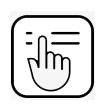Reckless behavior
Suicidal Thoughts
Appetite Loss
Guilt and despair
Delusions
Extremely overjoyed and energetic
Lack of energy
Depressed, hopeless, or irritable
Attention deficiency and loss of memory
Issues Sleeping
Faster Speech

Bipolar I Disorder
Bipolar I disorder is a type of bipolar spectrum disorder marked by at least one manic attack, with or without mixed or psychotic traits.

Bipolar II Disorder
Bipolar II disorder is a mood disorder on the bipolar spectrum, marked by at least one episode of hypomania and one attack of depression.

Cyclothymia
Cyclothymia is a rare mood condition. Cyclothymia causes emotional ups and downs, but they're not as intense as those in bipolar I or II disorder. With cyclothymia, you undergo periods when your mood noticeably moves up and down from your baseline.

Rapid cycling bipolar
Rapid cycling is a pattern of regular, distinct attacks of bipolar disorder. It can occur at any moment in the course of bipolar disorder & can come & go over many years relying on treatment; it is not necessarily an "endless" or indefinite pattern of episodes.

Bipolar disorder with mixed features
Bipolar with mixed features refers to the existence of high and low symptoms co-occurring, or as part of a single attack, in people encountering an episode of mania or depression.

Other types of Bipolar disorder
Other kinds of Bipolar disorder not otherwise specified (NOS) is one of those psychiatric words that can cause more confusion than clarity, especially to the diagnosed person. Bipolar disorder NOS is diagnosed when an individual shows some signs of bipolar disorder but doesn't necessarily fulfill all the criteria drafted in the Diagnostic and Statistical Manual of Mental Disorders.


855-722-4422

Having bipolar disorder does not mean you are broken, it means you are strong and brave for battling your mind every single day.

Unknown
Tap into the right support system and enhance your ability to anticipate, prevent, recognize, and proactively manage bipolar episodes.

Find A Counselor

Check Your Insurance

Book Your Online/Offline Therapy Session

A comprehensive treatment plan for bipolar disorder seeks to relieve symptoms and restore your ability to function. We help you with the right bipolar disorder counselor to give you the attention and care you need.
Interested in online therapy? Our therapeutic approach to bipolar disorder treatment makes online therapy convenient, secure & accessible from the comfort of your home.
Find Your Counselor
Our Therapists | Insurance | Services Offered | Privacy
Bipolar disorder comes in four forms:
Bipolar I disorder - People with bipolar I disorder have gone through one or more manic episodes. Although most patients with bipolar I will have both mania and depressive episodes, a depressive episode isn't required for a diagnosis. The depressive bouts typically persist for two weeks or longer. For a diagnosis of bipolar I, your manic episodes must last at least seven days or be so severe that you must be hospitalized. Mixed states can also be experienced by those with bipolar I. (episodes of both manic and depressive symptoms).
Bipolar II disorder -Depressive and hypomanic episodes are common in people with bipolar II illness. However, they never go through a full manic episode, a sign of bipolar I disease. Bipolar II disorder is frequently more incapacitating than bipolar I because chronic depression is more prevalent in bipolar II, even if hypomania is less incapacitating than mania.
Cyclothymic disorder (cyclothymia)- A persistently unstable mood characterizes the cyclothymic disorder. They go through mild sadness and hypomania for at least two years. Euthymia, or brief episodes of everyday mood, can occur in people with cyclothymia, but they seldom endure longer than eight weeks.
Other unspecified and specified bipolar and related disorders: If a person has experienced times of clinically significant aberrant mood elevation but does not fulfill the diagnostic standard for bipolar I, II, or cyclothymia, it is regarded to have other specified or undefined bipolar illness.
We accept many major commercial insurance plans, including Aetna, Amerihealth, Cigna, Optum Health, United Healthcare, Tricare, and others. If you don't see your insurance listed, we would be happy to verify your benefits to see if we can accept them, and if not, we offer you an affordable self-pay rate.
Begin your journey to better mental health. Read to learn more about bipolar disorder treatment & get the help you are looking for.